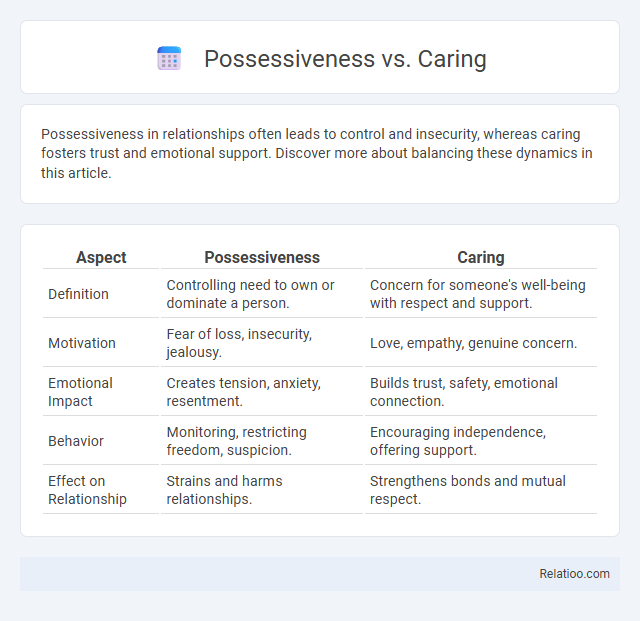Possessiveness in relationships often leads to control and insecurity, whereas caring fosters trust and emotional support. Discover more about balancing these dynamics in this article.
Table of Comparison
| Aspect | Possessiveness | Caring |
|---|---|---|
| Definition | Controlling need to own or dominate a person. | Concern for someone's well-being with respect and support. |
| Motivation | Fear of loss, insecurity, jealousy. | Love, empathy, genuine concern. |
| Emotional Impact | Creates tension, anxiety, resentment. | Builds trust, safety, emotional connection. |
| Behavior | Monitoring, restricting freedom, suspicion. | Encouraging independence, offering support. |
| Effect on Relationship | Strains and harms relationships. | Strengthens bonds and mutual respect. |
Understanding Possessiveness and Caring
Understanding possessiveness involves recognizing an intense desire to control or own someone, often driven by insecurity or fear of loss, which can lead to unhealthy relationship dynamics. Caring reflects genuine concern and support for another person's well-being without imposing restrictions or control, fostering trust and mutual respect. Differentiating possessiveness from caring is crucial for maintaining balanced relationships where emotional support coexists with personal freedom.
Key Differences Between Possessiveness and Caring
Possessiveness involves controlling behavior driven by fear of loss, often leading to jealousy and restriction, while caring is characterized by empathy, support, and respect for autonomy. Key differences include possessiveness limiting personal freedom versus caring enhancing trust and emotional security in relationships. Understanding these distinctions helps maintain healthy boundaries and nurture genuine connections.
Signs of Healthy Caring in Relationships
Signs of healthy caring in relationships include respecting your partner's individuality, supporting their goals, and maintaining open, honest communication without controlling behavior. Unlike possessiveness, which often manifests as jealousy and restricting your partner's freedom, caring builds trust and mutual respect. Healthy relationships balance emotional closeness with personal space, fostering growth and security for both individuals.
Warning Signals of Possessiveness
Warning signals of possessiveness include excessive jealousy, controlling behavior, and constant monitoring of Your activities. These behaviors can escalate into emotional manipulation or isolation from friends and family, indicating an unhealthy dynamic. Recognizing these red flags early helps protect Your emotional well-being and maintain balanced relationships.
Emotional Impact: Caring vs. Possessiveness
Caring fosters emotional security and trust by promoting empathy and genuine concern for others' well-being, while possessiveness often leads to feelings of control and anxiety, undermining relationships. Emotional impact from caring nurtures healthy bonds through support and understanding, whereas possessiveness triggers jealousy and fear, causing emotional strain. Prioritizing caring over possessiveness strengthens emotional resilience and mutual respect in interpersonal connections.
Root Causes of Possessive Behavior
Possessive behavior often stems from deep-rooted insecurities, fear of abandonment, or lack of trust in relationships, whereas caring is driven by genuine concern and respect for Your partner's well-being. The root causes of possessiveness include low self-esteem, past trauma, or unhealthy attachment styles, which can distort affection into controlling actions. Understanding these psychological triggers helps differentiate possessiveness from healthy care, promoting stronger, more balanced connections.
How Caring Enhances Relationship Trust
Caring fosters relationship trust by demonstrating genuine concern for a partner's well-being, which contrasts with possessiveness that often breeds insecurity and control. Acts of empathy, active listening, and support in caring create a safe emotional environment where trust can flourish. Research shows couples engaging in caring behaviors report higher trust levels and greater relationship satisfaction compared to those experiencing possessive dynamics.
Red Flags: When Caring Turns Into Control
Possessiveness often masquerades as caring, but the red flags emerge when concern turns into control, restricting your freedom and independence. Genuine care respects boundaries and encourages personal growth, while possessiveness demands constant attention and breeds insecurity. Recognizing controlling behavior early can help protect your emotional well-being and maintain healthy relationships.
Strategies to Address Possessiveness
Effective strategies to address possessiveness include fostering open communication, establishing healthy boundaries, and promoting mutual trust in relationships. Encouraging self-awareness helps individuals recognize possessive behaviors and their underlying insecurities, allowing You to manage emotions constructively. Prioritizing emotional support and reassurance can transform possessiveness into genuine caring, enhancing relationship stability and personal well-being.
Building Balanced and Supportive Connections
Possessiveness can hinder healthy relationships by creating control and jealousy, while genuine caring fosters trust and emotional support. Building balanced and supportive connections requires recognizing your partner's autonomy and expressing love through empathy and open communication. Prioritizing mutual respect and understanding ensures a strong foundation free from unhealthy possessiveness.

Infographic: Possessiveness vs Caring
 relatioo.com
relatioo.com